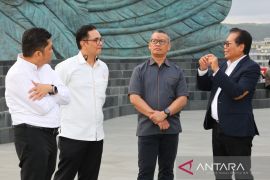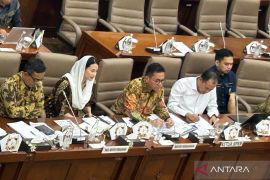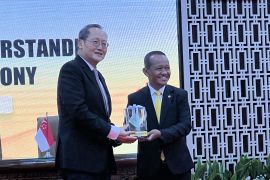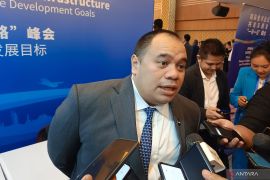"It is a good momentum to develop fishery industry . We have allowed foreign investors to wholly own cold storage, but no more foreign fishing company is allowed to operate in our waters," Rizal said recently.
He said many fish processing factories abroad have stopped operation as they are no longer allowed to catch fish in Indonesian waters.
He said the government has program to increase the capacity of local fishermen by offering fishing boats through their cooperatives.
"We want that fishing industry is entirely in the hands of Indonesian fishermen," the minister said.
Earlier, Marine and Fisheries Minister Susi Pudjiastuti expressed enthusiasm with the regulation allowing foreign investors to fully own business in cold storage.
The regulation could encourage local investors to contribute positively to the expansion of the fishery sector, Susi said.
The minister indicated that what the government has in mind is transfer of technology.
She said the foreign investors would bring in the technology to the country.
She asked local investors to take part in the development of the downstream fishery industry, saying ,"we must not be lagging behind the foreign investors."
She said the government will divide the area for locations of cold storage all over the country.
The facilities must not be concentrated in certain area such as Java to prevent big disparity in price, she said.
"We will distribute the cold storage projects in the North, South, East and West. We will open branches all over Indonesia," she said.
She said the new building of Gedung Mina Bahari (GMB) IV of the marine and fisheries ministry would provide a place to handle integrated One Stop Service to facilitate investment in the fishery sector.
"The One Stop Service system would facilitate and simplify all the procedures of licensing in the fishery sector," the minister said.
The building will have 20 lockets for various services and an outlet of state owned lender Bank Rakyat Indonesia (BRI).
The one stop services will include for licenses for imports of fish feed and feed basic materials , exports and imports of live fishes, and registration of exports and export destinations.
The new building will house several working units of the marine and fishery ministry currently still located in various areas .
In the first floor of the building there will be "Asean Economic Community (AEC)Center" which will serve as reference and information center for ASEAN cooperation in the marine and fishery sector.
Foreign domination
The People Coalition for Fishery Justice (Kiara) said fishery industry including fishing and fish processing industry should not be allowed to be dominated by foreign investors.
"Ideally, the industry should be closed to foreign investment," Kiara secretary general Abdul Halim told Antara here recently.
For that purpose, the government should encourage development of the fishery industry both in the upstream and downstream sectors with adequate budget and program facility, Halim said.
He said in the past 10 years, many fish processing companies in various areas in the country have operated much below their installed capacity on shortage in supply of basic material.
Shortage in supply of fresh fish is as high as 60 percent for some fish processing factories, he said.
The general chairman of the Indonesian Association of Fishery Companies (Gappindo) Herwindo said moratorium in licensing the operation of former foreign fishing boats by the Marine and Fishery Ministry has resulted in shortage in supply of fresh fish such as in Bitung, North Sulawesi.
"The cause of the shortage in supply of basic material is the moratorium in the use of former foreign fishing boats," Herwindo said.
The ban on transshipment of cargoes in the sea also contributed to the shortage of basic material supply, he said.
He said the fish processing company in Bitung, North Sulawesi, has to import fresh fish to feed its factory.
"I heard they imported tuna fish from India . Imports from Thailand and the Philippines are not allowed by the marine and fishery ministry," he said.
Herwindo said the domestic industry has suffered shortage in supply of fresh fishes for the last six months and the condition was already reported to the Director General of Strengthening Competitiveness of the Marine and Fishery Products Nilanto Perbowo by the association and tuna fish processing factories.
Reports said that North Sulawesis production of non cultivated fishes shrank 40 percent as a result of the moratorium.
"We have to acknowledge that non cultivated fish production in North Sulawesi fell 40 percent as a result of the moratorium policy," head of the North Sulawesi marine and fisheries service Ronald Sorongan said in Manado early this month.
Ronald said the moratorium serves a big blow to fishery industry in North Sulawesi. .
Meanwhile, chairman of the Jakarta branch of the Indonesian Association of Fishermen Yan M Winatasasmita urged Minister Susi Pudjiastuti to revoke the government regulation No 75 of 2015 on fishery levy.
The regulation weighed heavily on fishing boat owners, Yan M Winatasasmita said in a statement to Antara news agency.
He said the government has raised levy on fishery business and fishery products.
The reason given by the government in raising the levies was that fish production is abundant, he said, adding, but the policy had driven owners of fishing boats to the brink of bankruptcy leaving many fishermen jobless.(*)
Reporter: Muhammad Razi Rahman
Editor: Heru Purwanto
Copyright © ANTARA 2016











